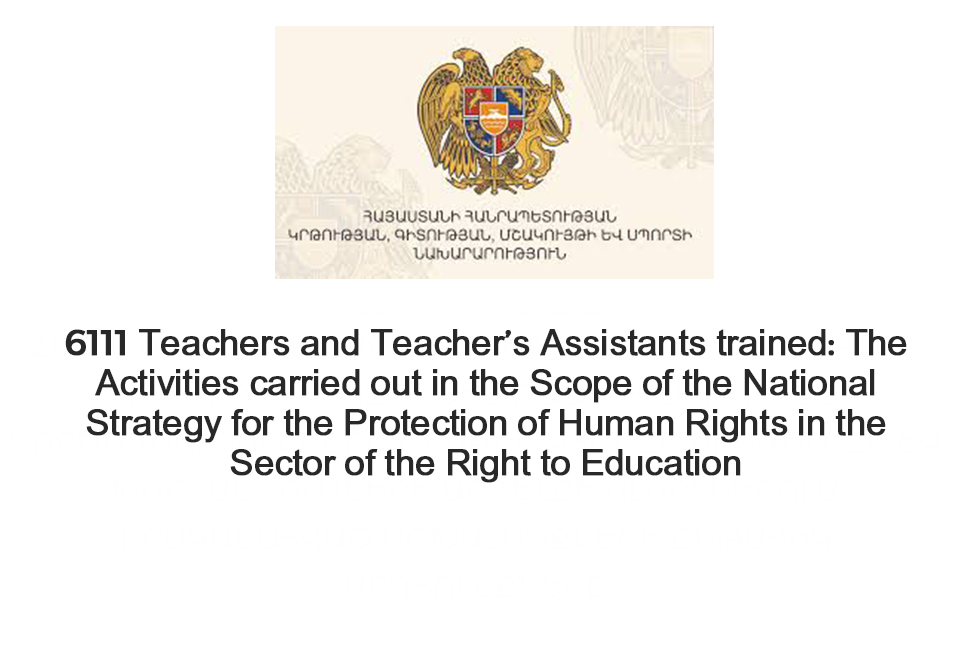
The “Promotion of Straight Democracy for Strengthening Human Rights in Armenia” project monitors the National Strategy for the Protection of Human Rights and its Implementation Action Plan. The program traditionally provides the public with summary information on the monitoring results, covering specific sectors of the Action Plan each week.
Previous materials have already presented to the public information on the work done by the RA Ministry of Labor, Social Affairs, RA Ministry of Territorial Administration and Infrastructure, RA Ministry of Defense, RA Police, RA Ministry of Justice, RA Ministry of Economy, and the RA State Revenue Committee. This week we will refer to the work carried out by the RA Ministry of Education, Science, Culture and Sport within the framework of the action plan, presenting the work done in the area of the right to education.
In the second half of 2020, the Action Plan for 2020-2022, based on the National Strategy for the Protection of Human Rights, provided for establishing legislation on enhancing the mechanisms to exercise the right to education for identification and registration of children dropped out of the education system (Action 60). The Ministry of Education, Science, Culture and Sports (MECS) did not provide information on the implementation of this action.
Action 61 envisages the adoption of strategy and an action plan to ensure inclusive education have been adopted for all educational levels, including the introduction of an inclusive education data collection monitoring mechanism; training given to 40% of teachers with new training modules, newly constructed educational institutions have a universal architectural design / 10% of general education institutions adapted to a universal architectural design.
According to the information provided by the Ministry of Education and Science of the Republic of Armenia, the protocol decision of the Government of the Republic of Armenia of 18 February, 2016 approved the “Action Plan and Schedule for the Implementation of the Inclusive Education System” in the field of general education. The Ministry did not provide additional information on the work done in 2020 on the above two issues.
The Ministry of Education and Science of the Republic of Armenia and USAID are jointly implementing the “Strengthening Inclusive Education System in Armenia” program, which aims to provide physical access to children with special educational needs (SEN) in targeted schools, and provide quality, effective pedagogical and psychological support services at school on regional and local levels. As a result of the project implementation, it is envisaged to have about 100 resource rooms with renovated and necessary equipment and didactic materials and 5 Territorial Pedagogical-Psychological Support Center (TPPSC). At present, the construction works have been completed in 9 secondary schools and 1 TPPSC of Syunik marz.
As for the trainings of teachers with new modules, in the context of the transition to general inclusion in the general education system in Kotayk and Gegharkunik marzes of the Republic of Armenia within the framework of “Family Environment and Community Services for Armenia” program, “Bridge of Hope” NGO trained 452 pedagogues of Gegharkunik marz and 386 pedagogues of Kotayk marz with the modules guaranteed by the RA Ministry of Education and Science. 3358 pedagogues were trained within the framework of trainings on inclusive education conducted by the Republican Pedagogical Psychological Center (RPPC). 1915 teachers and teacher’s assistants were trained within the framework of the inclusive education training program in the scope of the program “Ensuring the development of teaching skills of secondary school teachers and teacher’s assistants.” In general, 6111 teachers and teacher’s assistants were trained. However, the information provided by the Ministry of Education Science, Culture and Sport of the Republic of Armenia does not detail whether these trainings were carried out in 2020 or earlier.
More detailed monitoring results in the above and other areas will be presented in the monitoring report, which will be prepared after the completion of the research field work. A package of recommendations aimed at improving the implementation of the National Strategy for the protection of human rights in the country as a whole will be presented the competent authorities as well.
This publication has been produced in the scope of the “Promoting Direct Democracy for Strengthening Human Rights in Armenia” project implemented in the framework of the “Eastern Partnership Civil Society Facility” project funded by the European Union
The contents of this publication are the sole responsibility of the fellow for the “Promoting Direct Democracy for Strengthening of Human Rights in Armenia” project and do not necessarily reflect the opinion of the European Union.


